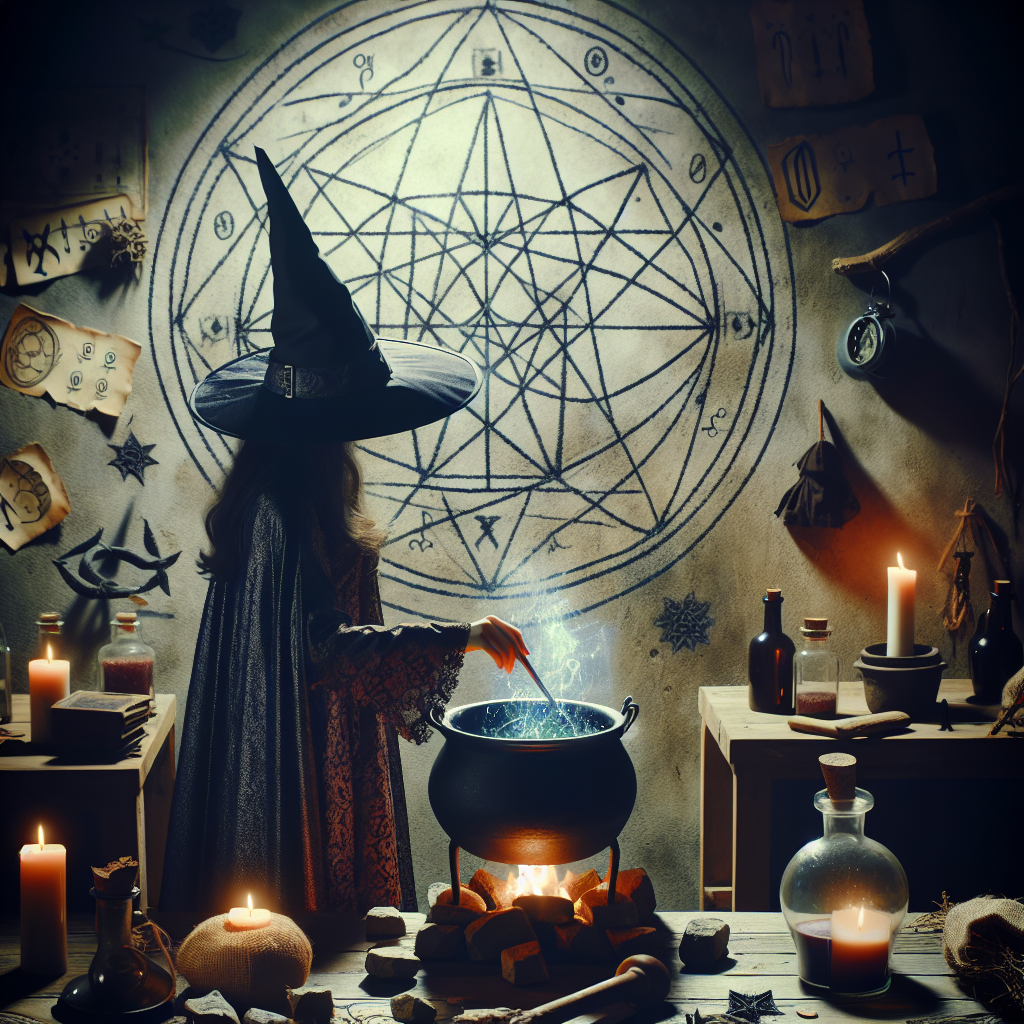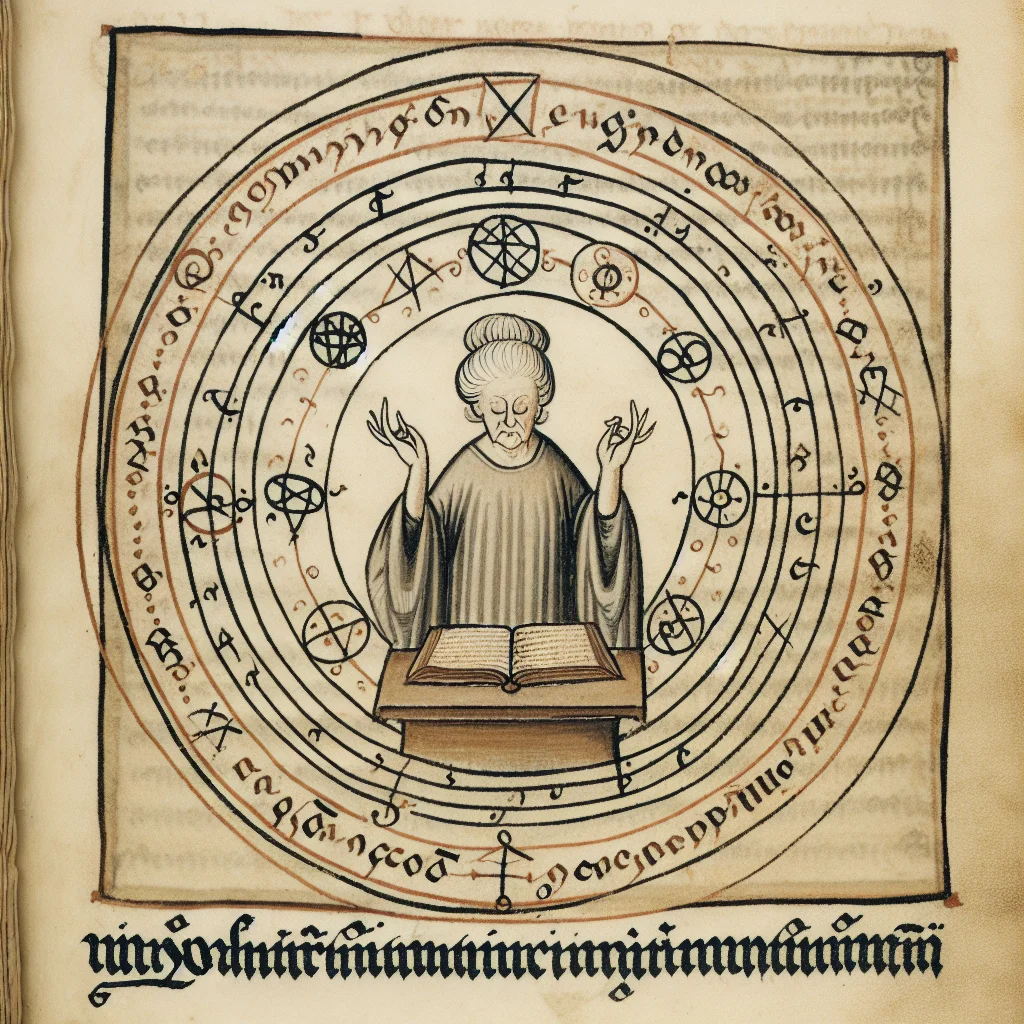As an Amazon Associate I earn from qualifying purchases.

Witchcraft, often defined as the use of magical faculties, most commonly for religious, divinatory, or medicinal purposes, has been a part of human folklore and belief systems since antiquity. The fear that witchcraft can harm others has led to numerous witch trials and executions throughout history, particularly during the early modern period in Europe and colonial America, as infamously seen in the Salem witch trials of 1692.
Since the dawn of civilization, witchcraft has been a pervasive element in narratives across different cultures, describing individuals capable of influencing the physical world or the minds of others through supernatural means. In some societies, witches have been feared for their purported ability to cast spells, summon curses, and harness the powers of the occult to inflict harm on individuals or communities. This perception has often manifested in blame for unexplained misfortunes such as diseases, poor harvests, and unexplained deaths.
While the belief in witchcraft and its potential to cause harm still exists in various cultures around the world, it is important to recognize the shift in perspectives in many communities. Today, developments in civil rights and evidence-based legal systems have mostly relegated witch hunts to the annals of history. However, some regions and groups still hold onto the conviction that witchcraft can have deleterious effects, leading to instances of social ostracism, persecution, or violence against those accused of being witches.
In certain parts of the world, accusations of witchcraft can still have devastating social consequences. A compelling statistic from the United Nations in 2009 suggested that over the course of 15 years, in just one region of Tanzania, more than 3,000 people were killed in witch hunts. This striking figure underscores the still-present belief in some cultures that witchcraft can harm others and the lengths to which people will go to protect themselves from supposed malevolent forces.
Though in much of the modern world, witchcraft is often regarded as a cultural artifact or a personal spiritual practice rather than a genuine threat, its representation in media and pop culture continues to influence how the concept is perceived and understood. As individuals and societies seek to balance skepticism with respect for cultural traditions, it is clear that the impact of witchcraft on the collective human consciousness remains a complex and evolving subject, rooted in the age-old dance between fear, understanding, and the unknown.
html
Does Witchcraft Have the Power to Inflict Harm? Unveiling the Effects of Magical Practices
Witchcraft—often surrounded by mystery and misconceptions—involves practices believed to harness supernatural powers. It has a controversial reputation, with a history that stretches across various cultures and centuries. The essential question about whether witchcraft can genuinely cause harm to individuals or communities hinges on perspective: from a sociocultural viewpoint, the belief in witchcraft’s ability to harm is potent and can lead to psychological stress or social ostracism. Scientifically, however, there’s no empirical evidence to support the idea that witchcraft can directly cause harm. Witchcraft’s real impact may lie in its influence on the mind and society—areas we’ll explore to understand the complexities behind the power ascribed to these enigmatic practices. Let’s delve deeper into the world of witchcraft to dissect the distinction between myth and measurable effect.
Can Witchcraft Harm Others? Understanding Its Impact
The question of whether witchcraft can harm others has been a topic of debate and speculation for centuries. Within various cultures and belief systems, there are diverse opinions on the potential impact of witchcraft. To understand this complex subject, it’s crucial to explore the psychological, social, and cultural aspects that play a role in how witchcraft is perceived and its alleged effects.
Psychological Impact of Witchcraft Beliefs
The belief in witchcraft itself can have significant psychological implications for both the practitioner and the target. When individuals believe they have been cursed or hexed, it can induce genuine fear, stress, and anxiety, which may lead to psychosomatic symptoms. These are physical symptoms with no identifiable physical cause, which are thought to arise from psychological or emotional distress. The power of suggestion can therefore be a potent force, causing individuals to attribute negative occurrences in their lives to witchcraft, which exacerbates their distress.
Cultural Context of Witchcraft
In societies where witchcraft is ingrained in the cultural fabric, the fear of being harmed by witchcraft can have tangible, harmful effects. Cultural beliefs can dictate how people interpret and react to life events, attributing misfortune such as illness, death, or crop failures to supernatural causes. This can result in social stigmatization, discrimination, and at times, violence against individuals branded as witches.
Outcomes of Witchcraft Accusations
The accusation of witchcraft can have dire consequences. Throughout history, individuals accused of practicing witchcraft have faced persecution, legal repercussions, and violence. In some parts of the world, witchcraft accusations can still lead to social ostracization, mob justice, and in extreme cases, death. The harm, therefore, often arises not from the practice of witchcraft itself, but from the reactions and actions of others in response to the belief in its existence.
Legal and Ethical Considerations
In modern legal systems, witchcraft is generally not recognized as a legitimate basis for causing harm. However, there are laws against fraud, psychological abuse, and the unlicensed practice of medicine, which can sometimes be applied to cases involving the alleged practice of witchcraft. Ethically, using the belief in witch—with the intention to intimidate, control, or exploit others—is considered by many to be morally reprehensible.
The Power of Suggestion and Placebo Effects
The power of suggestion plays a significant role in perceptions of witchcraft’s effectiveness. Just as a belief in positive outcomes can lead to placebo effects, belief in negative outcomes might lead to ‘nocebo’ effects where expectations of harm result in experiencing harm. This illustrates that the human mind is a powerful contributor to the experiences of benefit or harm from practices believed to have magical origins.
Empirical Evidence and Scientific Perspective
From a scientific standpoint, there’s a lack of empirical evidence supporting the notion that witchcraft holds any power to directly cause harm through supernatural means. Science bases its conclusions on observable, repeatable phenomena, and witchcraft does not typically meet this criterion. The impact attributed to witchcraft is often explained through understanding human psychology, cultural practices, and the power of belief systems.
Impact on Communities
In some communities, particularly in regions where belief in magic and witchcraft is strong, accusations can result in significant psychological and physical harm. Studies have shown increased incidents of violence toward individuals accused of witchcraft, disruptions to community cohesion, and impediments to social and economic development in areas where witchcraft accusations are prevalent.
Statistical Insight
Research into the belief in witchcraft and its social consequences can vary widely by region. For instance, a survey conducted by the Pew Research Center found that in sub-Saharan Africa, as many as 95% of respondents in certain countries believed in witchcraft, illustrating the deep cultural roots of such beliefs. In these areas, the perceived impact of witchcraft can be particularly significant, shaping social interactions and community dynamics in profound ways.
1. Q1: What is witchcraft and how is it typically practiced?
A1: Witchcraft refers to a broad range of practices that involve the use of rituals, spells, and the invocation of supernatural forces or entities. It is practiced in various forms around the world, with different cultural contexts influencing its methods and intentions. Common elements include rituals, charms, and the belief in magical influence.
2. Q2: Can witchcraft actually cause harm to others?
A2: Whether witchcraft can harm others is a matter of belief and debate. Some people believe that witchcraft can have a real effect on the physical world, including causing harm, while skeptics argue that any harm is either coincidental or psychosomatic.
3. Q3: Is there scientific evidence to support the effects of witchcraft?
A3: There is no scientific evidence that supports the supernatural claims of witchcraft having a direct physical impact. Science generally attributes reported effects to psychological suggestion, the placebo effect, or charlatanism.
4. Q4: How do cultural perceptions of witchcraft influence its potential to harm?
A4: Cultural perceptions deeply influence whether and how people believe witchcraft can harm. In some communities, fears of witchcraft are powerful, and the belief in its harmful abilities can lead to real-world consequences, such as social ostracism or even violence against accused witches.
5. Q5: Are there laws against using witchcraft to harm others?
A5: Yes, in some countries, there are laws that make it illegal to practice witchcraft with the intent to harm others. However, such laws are often difficult to enforce due to the lack of tangible evidence.
6. Q6: How does the concept of the “evil eye” relate to witchcraft and harm?
A6: The “evil eye” is a concept found in many cultures, where it is believed that envy or negative thoughts can cause actual harm to others. It is often associated with witchcraft, as casting the evil eye is sometimes considered a form of malevolent spell.
7. Q7: Can performing witchcraft have negative effects on the person casting the spells?
A7: According to some belief systems within witchcraft, performing spells with harmful intentions may lead to negative consequences or a backlash against the spellcaster, a concept sometimes referred to as the “threefold law” or karmic retribution.
8. Q8: What are the ethical implications of using witchcraft to influence others?
A8: Ethically, using witchcraft to influence others without their consent is considered problematic or harmful by many practitioners. The principle of free will is often highlighted, and many modern witches advocate for responsible use of their practices.
9. Q9: How can someone protect themselves against witchcraft believed to be harmful?
A9: Various protective measures are described in folklore and witchcraft traditions, ranging from amulets, symbols, and talismans to rituals and prayers designed to ward off harmful spells or influences.
10. Q10: What should someone do if they believe they are a victim of a harmful witchcraft practice?
A10: If someone believes they are a victim of witchcraft, they might seek advice from spiritual leaders, engage in their own protective rituals, or even consult with professionals, such as mental health counselors, for support in dealing with the psychological effects they may be experiencing.

Conclusion: Assessing the Impact of Witchcraft
Witchcraft, historically rooted in myriad cultures, is surrounded by controversy and ambiguity. While its practices can be diverse, ranging from benign rituals to more malevolent intentions, the consensus lies in its power being contingent on belief. Those who subscribe to the notion of witchcraft’s efficacy might feel its impact more acutely, experiencing harm through the nocebo effect, where negative expectations manifest as real-world consequences. The psychological implications for believers are significant, as individuals may suffer from stress, anxiety, or psychosomatic symptoms believed to be caused by witchcraft. Thus, the harm incurred is, in part, a product of the mind, reinforced by social and cultural contexts that validate these beliefs.
Conversely, skepticism about witchcraft’s effectiveness renders it harmless to non-believers, underscoring the subjective nature of its impact. Legal frameworks and ethical considerations have been established to protect individuals from accusations and persecution, which have historically led to social ostracism and violence. Despite this, in some regions, alleged witchcraft remains a source of fear, and accusations can still lead to human rights violations. In sum, the potential for witchcraft to harm others largely depends on personal belief systems and regional cultural norms, with tangible effects resulting more from the social and psychological responses to the idea of witchcraft rather than any intrinsic power it may or may not possess.
Amazon and the Amazon logo are trademarks of Amazon.com, Inc, or its affiliates.
Continue Your Magical Journey
Free Witchcraft Starter Kit
Get 6 free printable PDFs: grimoire pages, moon calendar, spells, crystals, herbs, and tarot journal.
We respect your privacy. Unsubscribe anytime.
Enhance Your Practice
As an Amazon Associate, I earn from qualifying purchases.

